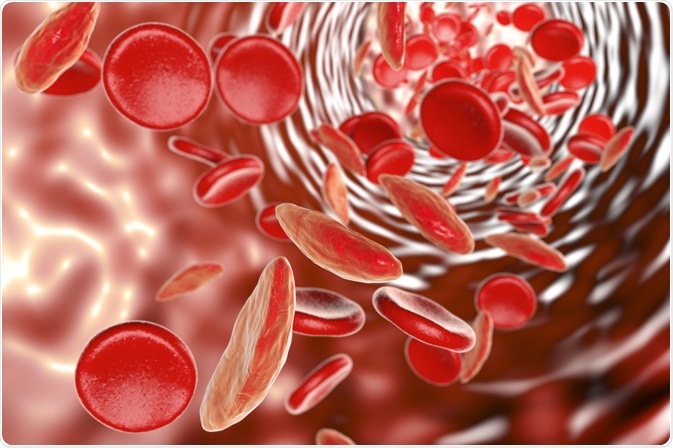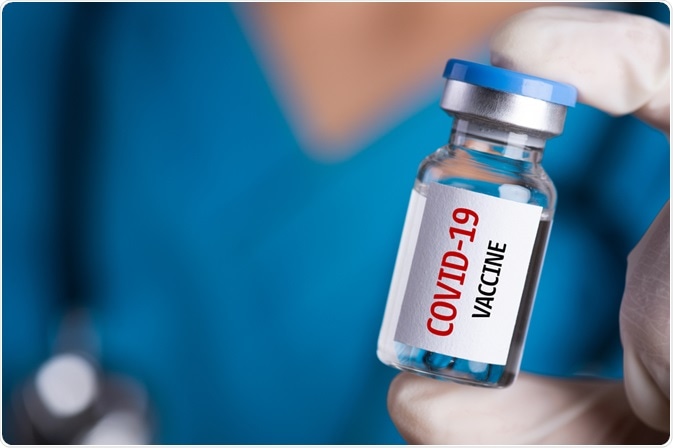Sickle cell disease (SCD) is a genetically inherited blood disorder characterized by the presence of sickled red blood cells (caused by a single mutation) that can get stuck in capillaries and cause clots. People with SCD must receive lifelong treatment and are at a heightened risk from clotting and tissue/organ ischemia. Viral infections (including influenza and COVID-19) can lead to complications in people with SCD.

Sickle Cell Disease (SCD). Image Credit: Kateryna Kon/Shutterstock.com
COVID-19 and SCD
People with SCD are classes as extremely clinically vulnerable (in the UK for example) due to being immunocompromised and are therefore strongly advised to be extremely cautious during the pandemic in adhering to the rules regarding shielding, social distancing, frequent handwashing & mask-wearing when out in public to minimize the risk of contracting COVID-19.
This is because the risk of adverse health effects and complications is greater in people with SCD. People with SCD have impaired immunity which can arise from functional hyposplenism and systemic vasculopathy – all increasing the risk of thrombosis (clotting) – which in itself is a common symptom and complication of COVID-19, especially in younger individuals.
Specific case studies have shown different outcomes depending on whether the SCD patient is of advanced age, has pre-existing comorbidities, or any SCD-related complications within 1-3 years or not. In general, people who have had SCD-related complications and crises close to contracting COVID-19 and/or have 1 or more comorbidities are at a far greater risk of developing more severe COVID-19, ICU admission, and in some cases, death. This is very much in line with influenza infection and disease severity, though the evidence for COVID-19 severity is recent and still emerging.
In one UK study, 6 out of 8 SCD patients with COVID-19 developed an SCD-related vaso-occlusive crisis (VOC) manifested clinically as varying degrees of pain in the body. All patients had hypoxemia and were given oxygen therapy to maintain oxygen SaO2>95%, analgesics for VOC pain, and antibiotics to prevent infection. The majority of these patients made a full recovery except 1 patient who had pre-existing comorbidities (previous stroke).
Another UK study saw 9 out of 10 SCD-COVID positive patients recovered without intensive treatment. 5 of the patients simply received oxygen and/or simple transfusions for their SCD, whilst the other 5 were supported at home without hospitalization and offered regular transfusions and hydroxyurea for their SCD. The one patient that died also suffered from severe asthma, lymphopenia, thrombocytopenia, and elevated C-reactive protein (CRP) which are all associated with poor COVID-19 outcome generally.
Young & healthy SCD patients vs older & comorbid patients
Whilst these 2 limited case studies show that the majority of younger, otherwise healthy (non-comorbid) SCD patients undergoing regular treatment with manageable symptoms tend to recover fully – either at home with regular medications, or with some support in hospital. Where severe complications arise, it is primarily due to age, pre-existing comorbidity (such as previous stroke, clotting, asthma in addition to the common risk factors for severe COVID-19 such as diabetes, hypertension, and lung disease), or the development of a secondary infection. These tend to go on to develop acute chest syndrome (ACS) requiring intubation and transfusion. Whilst some will make full recoveries, unfortunately, a small subset will go on to die.
As the evidence of clinical features of COVID-19 in SCD patients is still fully emerging, there have been some interesting observations. In some cases, COVID-19 may trigger VOC in people with SCD without any noticeable respiratory symptoms, as well as the lack of a fever – both common symptoms otherwise in COVID-19. Furthermore, the incidence of ACS in SCD patients with COVID-19 is now thought to be lower than initially expected, thankfully.
However, this largely applies to younger otherwise healthy SCD individuals, and not those with other conditions, complications poorly managed SCD (delayed treatments), and age. Specific risk factors for more severe combined COVID-19 and SCD are elevated D-dimer and prothrombin levels as well as reduced levels of fibrinogen. Thus, serum-based diagnostic tools should be used routinely to prognose the likelihood of severe disease, and harsher treatment strategies can be used earlier on.
In another study, 75% of 66 SCD patients with COVID-19 required hospitalization of which 7 (10%) died. Those more likely to be hospitalized had pre-existing kidney disease and ACS developed in 60% of those hospitalized (including those that died). The most common symptomatic presentation was that of VOC pain. Of all those that required hospitalization and subsequently died, all of them had pulmonary hypertension, congestive heart failure, chronic kidney disease, and stroke as comorbidities, as well as being over the age of 50. Furthermore, all deaths occurred in patients not taking hydroxyurea or any other SCDdisease-modifying treatment.

COVID-19 Vaccine. Image Credit: siam.pukkato/Shutterstock.com
SCD and COVID-19 vaccination
As patients with SCD are classed as clinically vulnerable, patients must be vaccinated at the earliest possible opportunity to minimize the risk of contracting COVID-19, and more importantly, reducing the overall risk of severe disease and death. The two main mRNA vaccines; Pfizer and Moderna, have been shown to be extremely safe and effective in the vast majority of people, including those with SCD.
Recently, the Oxford-Astra Zeneca and Johnson & Johnson vaccines have been in the news for their supposed links to increased clotting. However, these events are incredibly rare, and the benefits of vaccination far outweigh the risks associated with vaccination or COVID-19 itself, and therefore even people with SCD are strongly encouraged to get these vaccines, though it can be advisable to talk to your GP or healthcare professional beforehand if you are still unsure.
In summary, patients with SCD who develop COVID-19 are at an increased risk of moderate to severe disease, especially those that are older and those that have pre-existing underlying health conditions (comorbidities).
Further Reading
Last Updated: May 25, 2021